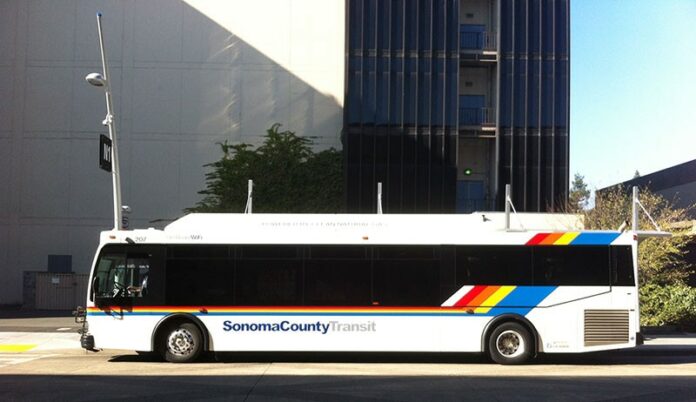Pressure is growing in communities around the world against Veolia Transdev, the worldwide industrial solutions firm based in France, clouded in political and environmental controversy and currently the operator of Sonoma County’s public bus line.
But the 25-year contract that gives the France-based giant several million dollars each year to operate the Sonoma County Transit bus fleet will come to an end in mid-2014, and local activists aligned against the company due to its support of Israel’s presence in Palestine want the county to part ways with Veolia.
The main beef against the company, which deals worldwide in waste and wastewater management, transportation and industrial-scale cooling systems, is the racially segregated bus line that Veolia operated in Israeli-occupied Palestine until last month. On Aug. 8, 2012, the Bohemian ran an op/ed asking for a boycott of Veolia Transportation, the company’s U.S. transport division and the employer of approximately 100 people in Sonoma County.
The Sonoma Alliance for a Fair Ride has led the anti-Veolia crusade on local soil. Lois Perlman, a member of the alliance, says she wants to see a U.S.-based firm operate the buses, both to keep profits within the country as well as to make a clear political statement that human rights violations, among other alleged offenses, will not be tolerated by local government.
But the matter is not one of choice, according to Bryan Albee, transit systems manager for Sonoma County Transit. He says once a call is made for bidders on a new 10-year contract, “all qualified proposers will be given equal consideration” and that it’s illegal for a federally funded service like Sonoma County Transit to show preference for one bidder based on anything but the applicant’s capacity to carry out the job.
First District supervisor Susan Gorin similarly told the Bohemian, “As a public body we are required to accept the lowest bidder, so it’s difficult to interject philosophical bias into an issue like this.”
But early this year in Davis, public sentiment may have played a role in a Veolia defeat. Veolia had placed a bid to construct a water-treatment plant. A community outcry followed, after which Veolia withdrew its offer.
Overall, a global rising tide of opposition against Veolia seems to be taking a financial toll on the giant, which has reportedly lost $20 billion in contracts in the past decade.
Though Veolia quit operating its controversial buses in Palestine in September, it still runs a train line and manages a wastewater treatment plant in parts of Palestine that have been seized by Israel. Veolia operates a landfill, too, on the West Bank. In a damning episode of scandal, Veolia claimed in 2011 to have divested from the Tovlan Landfill, but later, the Israeli Ministry of Environmental Protection confirmed publicly that Veolia remained the owner of the facility.
In the United States, Veolia Transportation operates a vast network of transit services. According to Albee, Veolia runs public transportation lines in California in Napa County, Redding, Chico, Yolo County, Yuba-Sutter counties and Modesto. Across the country and in Canada, Veolia has numerous contracts and even owns the ubiquitous airport shuttle service SuperShuttle. In San Jose, the city council recently unanimously voted to renew Veolia’s contract to operate an airport shuttle for four more years.
But pro-Palestine activists aren’t the only ones uneasy with Veolia’s presence. The corporation has run afoul of communities across the nation, mostly for wastewater-management-related violations. Locally, Veolia has been sued at least twice for dumping millions of gallons of sewage or contaminated water into San Francisco Bay. In each case—one in Burlingame, the other in Richmond—the company settled out of court.
Veolia Transportation may have lost even more credibility during the summer’s BART strike, when its vice-president of labor relations Thomas Hock offered his services as a strike negotiator to the transit line. BART agreed to pay Hock $399,000 to help settle the disagreement between the train line and its workers. Veolia was meanwhile being paid to operate extra shuttle buses for commuters along BART routes while train operators refused to work. Allegations were made that Hock had a conflict of interest—being paid to help end a strike while his own company was paid for each day the strike persisted.
The contract between Veolia and Sonoma County Transit ends on June 30, 2014. The county will then have the option of extending the contract for two years, until June 30, 2016, according to Albee at Sonoma County Transit. He says that five national firms, including Veolia, have the resources and competence to manage Sonoma County’s public buses. Just when a call for bidders will be made is not yet clear.









